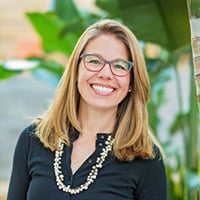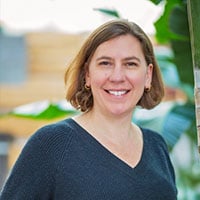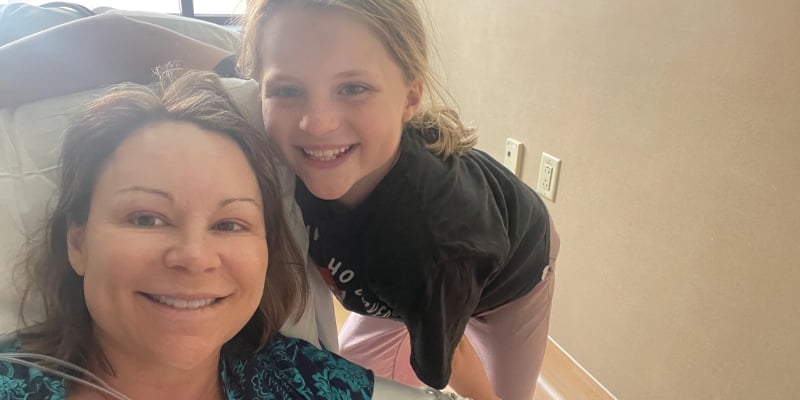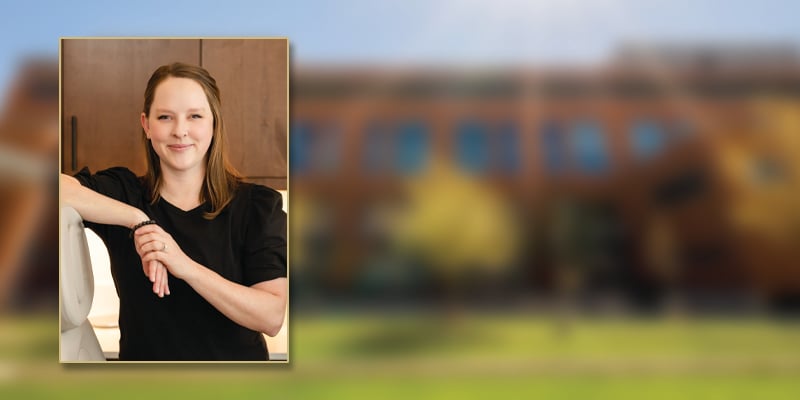After going through clinical rotations at the University of Colorado Department of Psychiatry, CU Nursing alums Sarah Schwenk and Leslie Choi aspired to make their training program even better.
Schwenk and Choi both earned their post-masters’ certificates from the Psychiatric Mental Health Nurse Practitioner (PMHNP) program at the University of Colorado College of Nursing at the Anschutz Medical Campus. The PMHNP program trains advanced-practice nurses how to treat mental illness and promote mental health to diverse patient populations in different settings.
As part of their pre-licensure training for the PMHNP certificate, the two had clinical placements at the CU Medicine Psychiatry – Outpatient Clinic, which is staffed by residents, social work interns and students.
Only a few years after completing the program, Schwenk and Choi are now co-directors of PMHNP Training at the CU College of Nursing. Upon taking the lead of the program, they increased the number of student rotations from two to 10 per year. The program also offers group supervision to supplement didactic coursework and clinical supervision.
“We felt strongly that we wanted to replicate and expand the program because we know how valuable this rotation is,” Schwenk says.
Improving the Clinical Training Program
Under the program, PMHNP students will maintain a schedule of two full clinical days per week for each student – more than 300 clinical hours over the course of six months, with oversight from Schwenk and Choi.
In addition to more rotations and more hours, the program also gives students different levels of in-depth experience.
“Typically, our students complete clinical hours where they follow a preceptor around and observe their interactions with clients,” Choi says. “They may do a bit of charting, but they aren’t particularly autonomous in such rotations. The rotation in the [CU Outpatient Clinic] is different in that they take on an entirely different level of autonomy – under the supervision of Sarah, myself, and the psychiatrists. We are really trying to meld the medical and nurse-practitioner model to enhance this experience.”
This is the first year of increasing the number of PMHNP students who will have more autonomous roles within the general clinic. Schwenk adds that the improvements were made in recognition that the increasingly complex healthcare environment requires a more in-depth and nuanced approach to clinical training.
“They get to experience what it is to hold a patient from assessment through the duration of their care,” Schwenk says. “And they get to do that working in an interdisciplinary fashion – both learning from interdisciplinary instructors, and other colleagues of ours from all around the healthcare system. Psychiatry doesn’t live in a vacuum, so we need practitioners who practice in that real-world, multidisciplinary, interdisciplinary way.”
In the context of patient care, “interdisciplinary” refers to an approach that involves a team of healthcare professionals with multiple specialties and fields working together to provide comprehensive and coordinated care by considering a patient’s physical and emotional needs.
PMHNP Specialty Director Kerry Peterson, PhD, DNP, characterizes the training program at the Department of Psychiatry as “one of the very best clinical experiences available to our PMHNP students.
“It is an amazing opportunity for our students to prepare them for excellence in their future PMHNP practices,” Peterson says.
“What I always came back to was that fundamentally, people’s mental health had a very significant influence on their recovery... That’s when I realized that I really wanted to come back to psychiatry because it felt like it was a place where I could influence the whole person from one specialty.”– PMHNP Training Co-Director Sarah Schwenk, PMHNP-BC ’18, MSN, BSN
About Schwenk and Choi

Leslie Choi (PMHNP-BC ’19, PNP ’14, BSN ‘02) |
As a Senior Instructor in the Department of Psychiatry, Choi (PMHNP-BC ’19, PNP ’14, BSN ‘02) served in the Navy for three years after graduating with her BSN. She earned her pediatric nurse practitioner (PNP) degree from CU Nursing and served families with a local school district.
Choi said she gravitated to psychiatry after realizing that mental health has greater “ripple effects” on individuals, families, and communities than almost any other health factor.
A three-time CU Nursing graduate, Schwenk (PMHNP-BC ’18, MSN, BSN), worked in inpatient and community psychiatry. She also worked at a rehabilitation hospital (Craig Hospital) for many years in clinical training, quality, and safety.
“What I always came back to was that fundamentally, people’s mental health had a very significant influence on their recovery,” Schwenk said. “So, somebody with a spinal cord injury who was profoundly depressed had a harder time recovering than someone with the same injury who got (appropriate mental health) treatment. That’s when I realized that I really wanted to come back to psychiatry because it felt like it was a place where I could influence the whole person from one specialty.”

Sarah Schwenk (PMHNP-BC ’18, MSN, BSN) |
In addition to her co-directing role with the PMHNP Training program, Schwenk concurrently serves as director of advance-practice providers at the Department of Psychiatry. She also serves as an assistant professor and nurse practitioner at the Helen and Arthur E. Johnson Depression Center, and the director of behavioral health at the Infectious Disease Group Practice.
Both Choi and Schwenk share a passion for equipping the mental health professionals of the future with the skills and knowledge they need to address Colorado’s mental health woes.
“We know that Colorado is a desert for access to qualified trained professionals who can do this work in safe and effective ways,” Schwenk says. “So, the more that we can train people, the more we can have people working throughout the state.”


